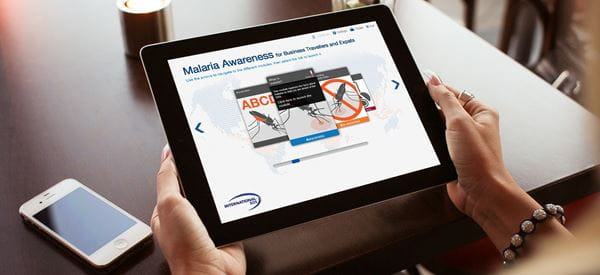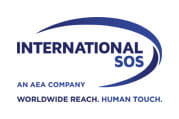Malaria
Defeat malaria
International SOS is supporting World Health Organization's vision of a world free of malaria. We are raising awareness through global health promotion activities in local communities, remote locations, our offices and clinics.
Malaria is a serious and sometimes fatal disease. In 2013 alone, there were about 198 million cases of malaria and an estimated 584,000 deaths.
Malaria, caused by the Plasmodium parasite, is a real risk to business travellers, employees and expatriates in over 90 countries. However, malaria can be prevented and treated.
Business travel to sub-Saharan Africa is likely to increase as Western countries vie to gain a foothold in the region. In August 2014 US companies committed to invest US$14 billion in Africa; and sub-Saharan Africa's economy is expected to grow at nearly 6% a year on average over the next decade - the fastest of any region in the world. With this growth, there is potentially an increased risk to the health of travellers and international assignees from diseases such as malaria.

International SOS provides education and malaria prevention services to reduce risks to organisations and their travelling employees. The value of such programmes was highlighted in the Return on Prevention study, published by research and consultancy firm Prevent in 2015. The analysis of one company’s malaria prevention programme demonstrated a decrease in the occurrence of fatal cases by 70%.
- Assess and understand the risks of exposure at your destination: We analyse and evaluate any location you are sending your employees to and recommend measures that help mitigate risks.
- Educate your travellers before they depart: Through our specialist medical information and education programmes, we help you to prepare your travellers for the local situation as well as advise on measures to take should the situation deteriorate.
- Around the clock access for your travellers to specific local advice: Our qualified doctors and security specialists are there for your employees, no matter what, where or when.
- Stay connected with your travellers and keep track of them in a high risk location: We make sure your employees receive the latest information and are prepared at all times.
How does malaria spread?
Malaria is spread to humans via the bite of an infected mosquito. The parasite develops in the Anopheles mosquito, which typically only bites at night (from dusk until dawn).
Prevention
The use of protective clothing, insect repellents and bed nets can greatly reduce the risk of being bitten. Take antimalarial medication if prescribed for you. At a community level, spraying insecticide indoors and eliminating mosquito breeding areas also help reduce the risk of infection.
Malaria symptoms
Symptoms can develop about seven days after being bitten but can take several months to a year to appear. This is why it is important to notify your doctor of your travel history whenever you develop 'flulike' symptoms, even up to a year after visiting a malarial area.
Early malaria symptoms are flu-like, and include fever, head and body aches, generally feeling tired and unwell. Later symptoms can be episodic (come and go) and may include chills, shaking (rigors), high fever, sweating, severe fatigue, nausea, vomiting, diarrhoea and jaundice.
If not promptly treated, malaria can be severe. It may cause mental confusion, seizures, kidney failure, coma and death. Travellers are more likely to suffer these complications than local inhabitants.
About World Malaria Day
On 25 April 2015 people across the globe took part in a wide range of activities to mark World Malaria Day. More information can be found here.




